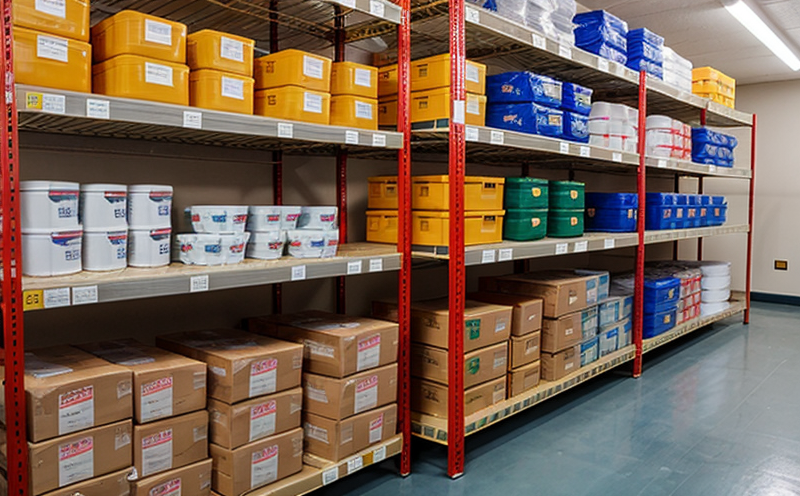Humidity Controlled Stability Testing
The pharmaceutical industry is heavily regulated to ensure that drug products are safe and effective. One critical aspect of this regulation is stability testing, which aims to determine the shelf-life of a product under various environmental conditions. Humidity controlled stability testing specifically focuses on understanding how changes in humidity affect the stability and efficacy of pharmaceuticals.
Humidity plays a significant role in the degradation processes of drug products. Factors such as moisture absorption, hydrolysis reactions, and interaction with other components can lead to reduced potency or increased impurities. This service involves exposing drug formulations to controlled humidity levels over extended periods to simulate real-world storage conditions. The primary goal is to predict potential stability issues early on in the development process.
Our lab employs advanced equipment capable of maintaining precise humidity levels, temperature ranges, and time frames as specified by regulatory guidelines such as ISO, ASTM, and industry standards like the FDA. These tests help pharmaceutical companies make informed decisions about packaging, storage conditions, and labeling.
Our approach ensures that the testing is both realistic and compliant with current practices. By simulating actual market exposure scenarios, we provide accurate data that supports regulatory submissions and commercialization strategies.
A key aspect of our service is ensuring reproducibility and reliability across multiple environments. This means conducting tests under different humidity levels to account for variations in global markets where products may be sold. Replicating conditions accurately allows clients to confidently choose the best packaging solution based on scientific evidence rather than guesswork.
Another important consideration during this type of testing is understanding how humidity interacts with excipients and active ingredients present within a drug formulation. Understanding these interactions helps identify any potential stability issues early in development, allowing for necessary adjustments before moving forward into larger scale manufacturing or clinical trials.
The results from our humidity controlled stability tests can be used to support various aspects of product lifecycle management including:
- Determining optimal packaging solutions
- Establishing appropriate storage conditions for distribution networks
- Supporting labeling requirements related to shelf life claims
- Facilitating discussions with regulatory bodies during pre-market approvals
- Providing input into post-marketing surveillance programs
We also offer comprehensive reporting services which include detailed documentation of all test parameters, observations made throughout the course of testing, and recommendations based on findings. This ensures transparency and clarity for stakeholders involved in decision making processes.
By leveraging our expertise in this area, we help ensure that pharmaceutical manufacturers can bring safe, effective products to market while adhering to stringent quality standards set forth by regulatory agencies worldwide.
Benefits
Conducting thorough humidity controlled stability testing offers numerous advantages:
- Predicts Potential Degradation Issues: By simulating real-world storage conditions, we can identify any potential stability issues early on. This allows for necessary adjustments to be made before moving forward into larger scale manufacturing or clinical trials.
- Supports Regulatory Compliance: The results from our tests support various aspects of product lifecycle management including labeling requirements related to shelf life claims and facilitating discussions with regulatory bodies during pre-market approvals.
- Informed Packaging Decisions: Understanding how humidity interacts with excipients and active ingredients present within a drug formulation helps identify the optimal packaging solution based on scientific evidence.
- Prolongs Shelf Life: With precise control over temperature, humidity levels, and time frames, we can help extend the shelf life of pharmaceuticals beyond what might otherwise be achieved through standard methods alone.
The insights gained from these tests enable manufacturers to make informed decisions about product quality, ultimately leading to improved patient outcomes and increased customer satisfaction.
Use Cases and Application Examples
Humidity controlled stability testing finds application across various areas within the pharmaceutical industry:
- New Drug Development: Early identification of potential stability issues can prevent costly failures later in development. This ensures that only high-quality products reach clinical trials.
- Formulation Optimization: Understanding how different ingredients interact under varying humidity conditions allows for optimization of formulations to maximize efficacy and minimize side effects.
- Packaging Selection: By simulating real-world storage scenarios, we assist in selecting the most appropriate packaging materials that best protect drug products from environmental factors like moisture.
- Distribution Network Design: Knowing how humidity affects pharmaceuticals helps design distribution networks capable of maintaining optimal conditions for storing and transporting these valuable goods safely to market.
In summary, this type of testing plays a vital role in ensuring the safety and effectiveness of drug products throughout their lifecycle. It provides essential information needed by manufacturers to meet regulatory requirements while also enhancing product quality and patient safety.
International Acceptance and Recognition
The importance of humidity controlled stability testing is widely recognized internationally. Organizations such as the ISO, ASTM, and the FDA have established guidelines that emphasize the significance of this testing method for ensuring product quality.
The ISO standard specifies the general principles and requirements for stability testing, including humidity controlled testing. Similarly, ASTM provides detailed procedures for conducting these tests under various conditions. In the United States, FDA regulations mandate that all new drug applications must include data from appropriate stability studies conducted using methods consistent with accepted scientific practices.
Recognizing the global nature of pharmaceutical markets, companies often seek to demonstrate compliance with multiple sets of standards when marketing their products internationally. Our lab is well-equipped to assist in meeting these diverse requirements through our comprehensive testing services and detailed reports tailored specifically for different regions.





